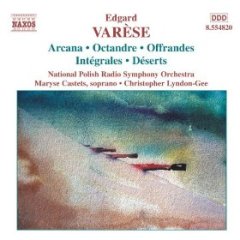Edgard Varese – Arcana-Integrals-Deserts (Lyndon-Gee)
Edgard Varese – Arcana-Integrals-Deserts (Lyndon-Gee)

1. Arcana 18:46 2. Octandre: I. Assez lent 2:33 3. Octandre: II. Tres vif et nerveaux 1:51 4. Octandre: III. Grave 2:23 5. Offrandes: Chanson de La-haut 3:33 6. Offrandes: La Croix du Sud 3:44 7. Integrales 11:07 8. Deserts 3:57 9. Deserts: First Electronic Interpolation (beginning) 2:57 10. Deserts: First Electronic Interpolation (conclusion) 8:18 11. Deserts: Second Electronic Interpolation (beginning) 2:10 12. Deserts: Second Electronic Interpolation (conclusion) 1:53 13. Deserts: Third Electronic Interpolation (beginning) 4:11 14. Deserts: Third Electronic Interpolation (conclusion) 3:40 Maryse Castets - soprano (Tracks 5-6) Polish National Radio Symphony Orchestra Christopher Lyndon-Gee – conductor
'Music was born free, and to win back its freedom is its destiny' proclaimed composer Ferruccio Busoni in 1906. His sentiments were shared by Edgard Varèse, who also dreamed of 'the liberation of sound'.
The two men shared a vision of a new music in which the constraints of their times would be swept aside. Busoni considered Varèse his natural successor, describing him as 'the illustrious future', and Varèse took Busoni's ideas further than the older composer could ever have imagined.
Varèse had a conception of music in which in which individual sounds function as 'intelligent' entities, moving independently in space. This led him to the concept of 'sound as living matter'. He fought for a music that would be, as he described it, 'open rather than bounded'. It should move beyond the conventional and, most problematically, beyond what was possible on existing musical instruments.
Although born in Paris, Varèse was of Italian descent on his father's side. His musical studies began in Turin after the family had moved to Italy. His rebellious streak showed itself early on, when he ran away back to Paris. He continued his studies in the French capital, enrolling at both of the city's main musical institutions, the Schola Cantorum and the Conservatoire. Roussel and Widor were among his teachers. Following his studies, Varèse embarked on a conducting career. He composed a large amount of orchestral music in these early years, although little of it was ever performed. He hardly mixed in musical circles, but did gain the friendship and esteem of Debussy, Richard Strauss and Busoni. For the most part though he preferred socialising with avant-garde painters and writers rather than with musicians.
The music Varèse composed in Europe was virtually all destroyed in a warehouse fire. As a result, his mature music today seems 'orphaned', and his early development as a composer hidden from us. But rather than treat the incident as a misfortune, Varèse seems to have welcomed the new start that it offered. He moved to New York, where in 1921 he founded the International Composers' Guild. This would become the blueprint for many new-music organisations around the world in later years.
Varèse's compositions from the 1920s and 30s were at the cutting edge of musical Modernism. In them, he explored new ideas in a more radical and consistent way than any of his contemporaries. Such works as Amériques and Arcana for orchestra, Hyperprism and Intégrales for chamber ensemble and Ionisation for 13 percussionists are fiercely concentrated and monolithic. They reject traditional notions of form and harmony, and instead exploit pungent dissonance, piercing timbres and complex rhythms.
The musical ideas he had been discussing for years were finally given full expression in these works. The notion of music is expanded to 'organised sound'. Its structures 'limitless as the exterior forms of crystals'. And constituent sounds are 'projected', giving the impression of 'a journey into space'. Radical distinctions between different instrumental timbres help Varèse to define the contours of his music. A wide range of percussion instruments and noise makers are also an integral part of his ensembles, regularly taking centre stage. His goal, he once said, was 'to be in the material, part of the acoustic vibration'. Gradually however he lapsed into silence.
From 1936 to 1950 he worked on several ambitious projects, but none came to fruition. The limitations of conventional musical instruments continually impeded his compositional ideas. He believed the answer could be found in electronics, but had no access to a studio. Finally, in the 1950s, technology caught up with his ideas, and he was able to give his dreams real sonic form. The resulting works, the electro-acoustic Déserts and the tape piece Poème électronique, set the agenda for the emerging discipline of electronic composition. Poème électronique also introduced the composer's work to a wider audience when it was heard by thousands of visitors as part of the Phillips Pavilion attraction at the 1958 Brussels World Fair. --- sinfinimusic.com
download: uploaded anonfiles 4shared ziddu mediafire hostuje sugarsync gett








